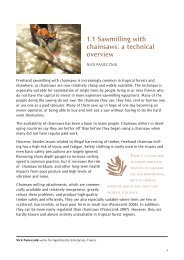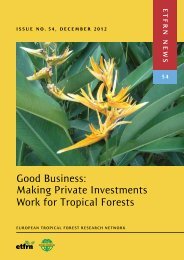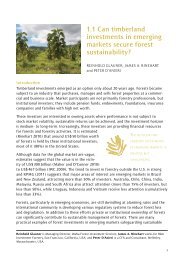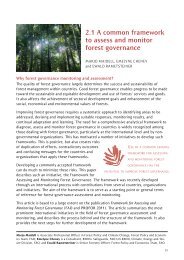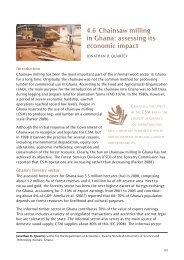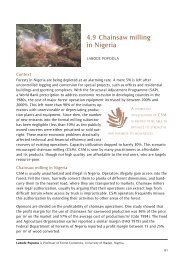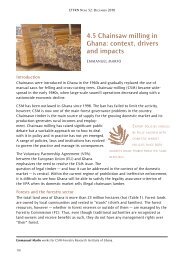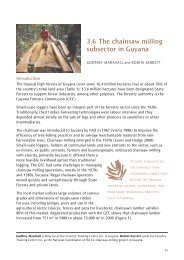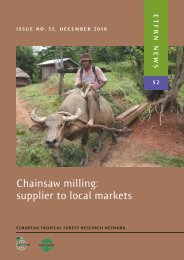Chainsaw milling: supplier to local markets - European Tropical ...
Chainsaw milling: supplier to local markets - European Tropical ...
Chainsaw milling: supplier to local markets - European Tropical ...
Create successful ePaper yourself
Turn your PDF publications into a flip-book with our unique Google optimized e-Paper software.
Linking timber legality and social norms on legality<br />
although the different norms on timber legality and law enforcement are recognized in<br />
international agreements and national laws, they are not systematically considered in the<br />
emerging programmes on timber legality. This is demonstrated in the first legally ratified<br />
FlEGT/Vpa agreement between the Eu and Ghana. The preamble states that “the parties<br />
shall seek <strong>to</strong> minimize any adverse impacts on indigenous and <strong>local</strong> communities and poor<br />
people which may arise as a direct consequence of implementing this agreement.” article<br />
17 indicates that the parties “agree <strong>to</strong> develop a better understanding of the livelihoods<br />
of potentially affected indigenous and <strong>local</strong> communities as well as the timber industry,<br />
including those engaged in illegal logging” and that they will moni<strong>to</strong>r these impacts and<br />
take reasonable steps <strong>to</strong> mitigate any adverse impacts. These principles are not further<br />
elaborated, however, nor is there reference <strong>to</strong> the fact that Csm is illegal in Ghana. This<br />
limited attention <strong>to</strong> social issues stands in contrast <strong>to</strong> the extensive elaboration of the<br />
articles defining the various technical issues regarding timber legality (owusu et al. 2010).<br />
scenarios for stimulating timber legality and governance<br />
in view of the different governance regimes for timber production, an important question<br />
is whether timber legality programmes are focused on governing the traditional forestry<br />
sec<strong>to</strong>r (characterized by timber exploitation by forest business enterprises), or whether<br />
they also include artisanal forestry activities (characterized by timber production forming<br />
a livelihood activity of mostly rural people). Two sets of competing principles underlie the<br />
basic foundation of timber legality programmes:<br />
• should the programme have a legality focus or a livelihood improvement focus?<br />
• should the programme focus on legal timber production for the export market or on<br />
legal timber for both the international and domestic market?<br />
on the basis of these competing principles, four policy scenarios on how <strong>to</strong> link timber<br />
legality and governance can be distinguished (Figure 1).<br />
Figure 1. policy scenarios for timber legality and forest governance<br />
Timber legality<br />
concerns the<br />
international market<br />
5.1 DEvElopiNg TimbER lEgaliTy REgimEs<br />
Timber production as timber enterprise activity<br />
FLEET FLETS<br />
FLEETL<br />
FLETSL<br />
Timber production as livelihood activity<br />
Timber legality<br />
concerns both<br />
domestic and<br />
international<br />
market<br />
209



